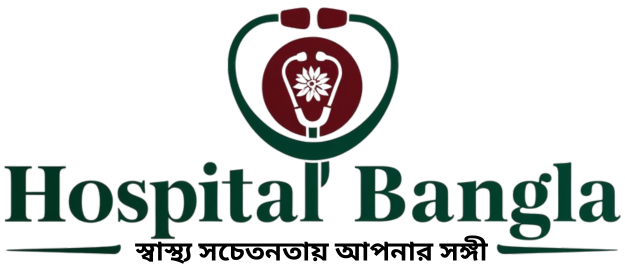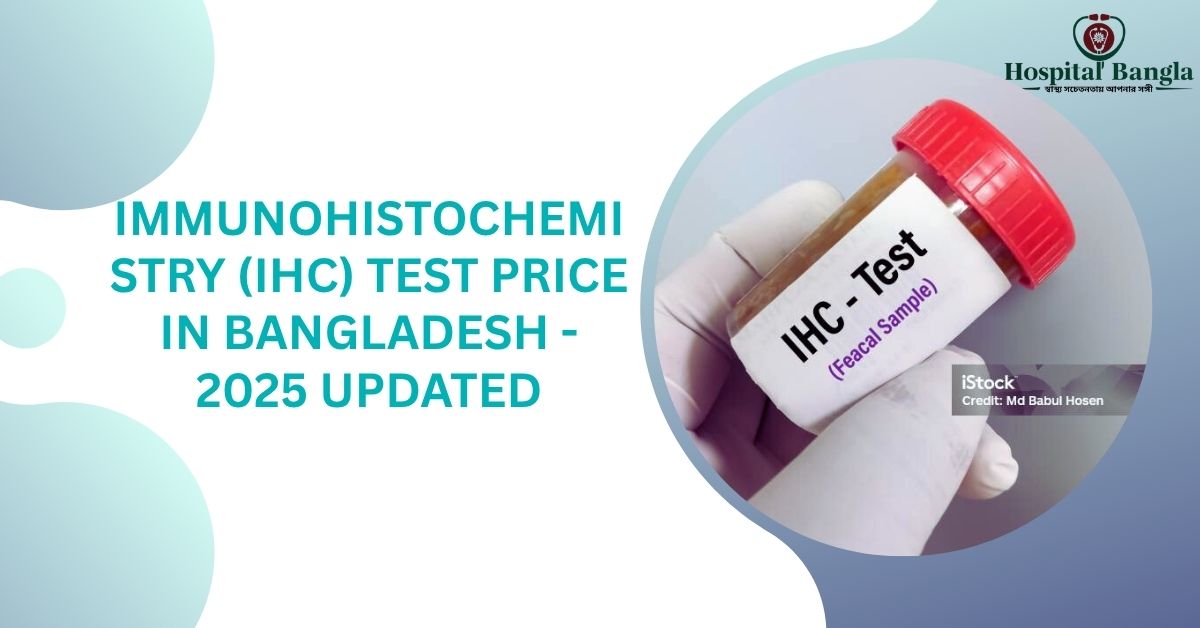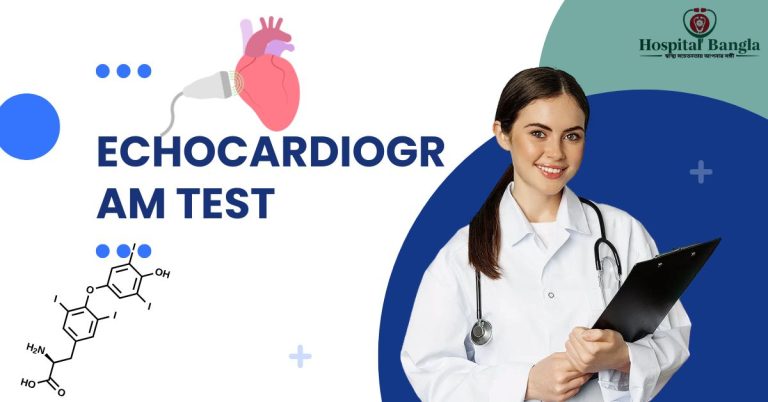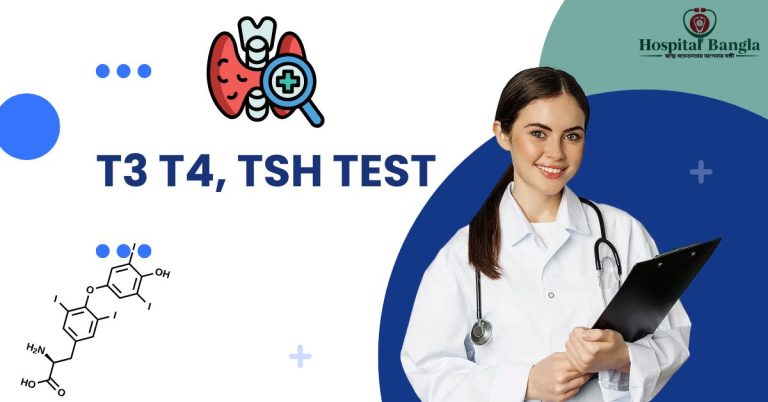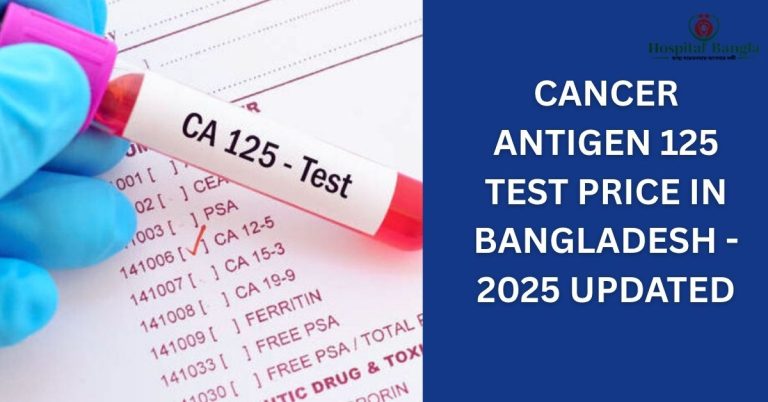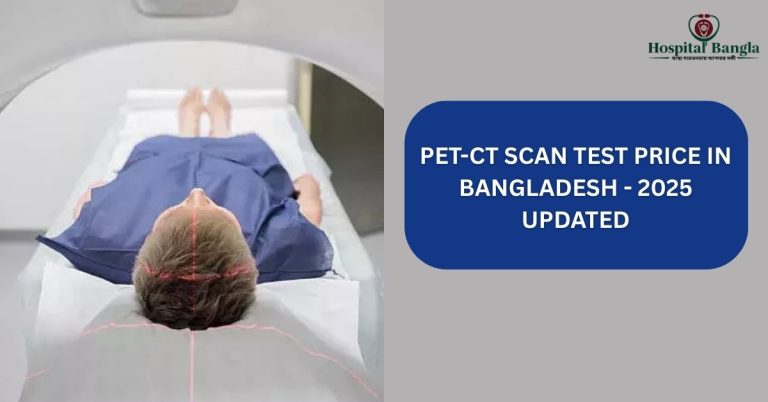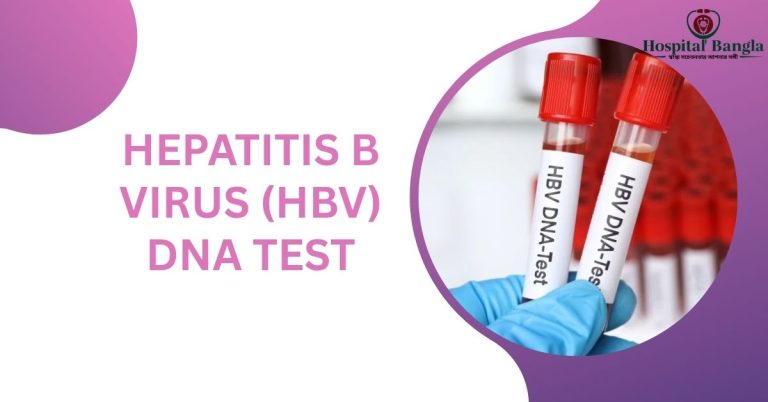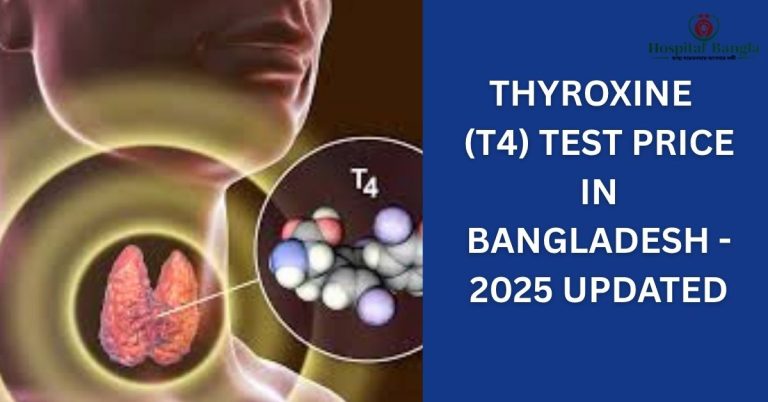Immunohistochemistry Test Price in Bangladesh – 2025 Updated
Immunohistochemistry (IHC) is a specialized laboratory technique used to detect specific proteins, or antigens, in tissue samples, playing a critical role in diagnosing diseases, particularly cancer. By identifying markers like estrogen receptors (ER) or HER2 in breast cancer, IHC helps doctors determine the disease type, stage, and appropriate treatment. In Bangladesh, patients often require IHC tests following a biopsy to confirm a diagnosis or guide therapy. The Immunohistochemistry Test price in Bangladesh typically ranges from 2,000 BDT to 30,000 BDT in 2025, depending on the specific test and facility. This article provides a detailed overview of IHC tests, their purpose, preparation, and pricing across government and private hospitals in Bangladesh.
What is an Immunohistochemistry Test?
Immunohistochemistry (IHC) is a diagnostic method that uses antibodies to detect specific proteins in tissue sections, visualized through staining techniques. The process involves applying antibodies to a tissue sample, which bind to target antigens, followed by a chromogen or fluorescent dye to make the proteins visible under a microscope. This allows pathologists to assess the presence, location, and quantity of specific proteins.
- What it Measures: IHC identifies proteins or antigens in tissue, indicating the presence of specific diseases or their characteristics.
- Clinical Significance: It is widely used in oncology to classify tumors, determine their origin, and predict their behavior. For example, in breast cancer, IHC tests for ER, progesterone receptors (PR), and HER2 guide treatment decisions like hormone therapy or targeted therapies.
- Medical Conditions Requiring IHC: IHC is commonly used for cancers (e.g., breast, lymphoma, sarcoma), autoimmune diseases, and certain infectious diseases where identifying pathogens in tissue is necessary.
- Alternative Names: IHC is also known as immunostaining or, when applied to cells rather than tissues, immunocytochemistry.
When is an Immunohistochemistry Test Recommended?
IHC tests are recommended when standard pathology techniques, such as hematoxylin and eosin (H&E) staining, cannot provide a definitive diagnosis. Doctors use IHC to gain deeper insights into tissue samples. Specific scenarios include:
- Cancer Diagnosis: IHC identifies cancer types, grades, and stages. For instance, it determines if a breast tumor is hormone receptor-positive or HER2-positive.
- Tumor Differentiation: When a tumor’s origin is unclear, IHC detects specific markers to pinpoint the tissue source.
- Prognostic Information: Markers like KI-67 indicate tumor aggressiveness, helping predict disease progression and treatment response.
- Treatment Monitoring: IHC may assess how a tumor responds to therapy in some cases.
Doctors rely on IHC results to tailor treatments, such as hormone therapy, chemotherapy, or targeted therapies. IHC is primarily a diagnostic tool, not used for routine screening or monitoring in the general population.
Immunohistochemistry Test Preparation
Since IHC is performed on tissue samples, patient preparation is minimal compared to blood tests. Key considerations include:
- Fasting Requirements: No fasting is needed, as the test analyzes tissue, not blood.
- Medications: Patients typically do not need to stop medications, but should inform their doctor about any drugs they are taking, as some may affect tissue quality or interpretation.
- Sample Collection: The tissue sample is obtained via biopsy, which may involve fine needle aspiration (FNA), core needle biopsy, or surgical biopsy, depending on the tissue’s location and nature.
- Test Duration: The biopsy procedure is usually quick, but the IHC process in the lab can take a few hours to several days, depending on the number of markers tested and the complexity of the stains.
Immunohistochemistry Test Price List in Government Hospitals in Bangladesh
Government hospitals in Bangladesh offer IHC tests at subsidized rates, making them more accessible. Below is a table of prices for IHC tests in a major government hospital, based on data available as of 2025.
| Hospital Name | Location | Immunohistochemistry Test Price (BDT) | Contact Number |
|---|---|---|---|
| Bangabandhu Sheikh Mujib Medical University (BSMMU) PG Hospital | Dhaka | – Lymphoma panel: 15,000 – Breast panel (ER, PR, Her 2/neu): 8,000 – Single antibody: 3,000 | Contact BSMMU for details |
Note: Prices for other government hospitals, such as Dhaka Medical College Hospital or Chittagong Medical College Hospital, may vary and are not widely available online. Patients should contact these hospitals directly for current pricing.
Immunohistochemistry Test Price List in Private Hospitals in Bangladesh
Private hospitals and diagnostic centers in Bangladesh offer a broader range of IHC tests, often with specialized panels. Below is a table of prices for IHC tests in major private facilities, based on data from 2025.
| Hospital/Diagnostic Center | Location | Immunohistochemistry Test Price (BDT) | Contact Number |
|---|---|---|---|
| Popular Hospital | Dhaka | – IHC panel-1: 10,000 – IHC panel-2: 15,000 – IHC panel-3: 18,000 – IHC panel-4: 20,000 – IHC panel-5: 25,000 – IHC panel-6: 30,000 | Contact Popular Hospital for details |
| Neuroscience Hospital | Dhaka | – Single marker (e.g., ALK, AMACR): 2,000–2,500 – Two markers: 4,000 – ER, PR, HER-2: 5,000 – ER, PR, HER-2, KI-67: 7,000 – Extra Large Panel: 20,000 | Contact hospital for details |
| Square Hospital | Dhaka | – Breast Cancer Biomarkers (ER, PR, Her2neu, P53, Ki67): Contact for pricing | Contact Square Hospital for details |
| Ibn Sina Diagnostic & Consultation Center | Dhaka | – Contact for specific IHC test pricing | Contact Ibn Sina for details |
Note: Prices for other private hospitals, such as Evercare Hospital or United Hospital, may vary. Patients are advised to check with the respective facilities or visit HospitalBangla.com for updated pricing.
Understanding Immunohistochemistry Test Results
Interpreting IHC results requires expertise, as they depend on the specific markers tested and the disease context. Results are typically reported as positive or negative for the presence of an antigen, often with a score indicating staining intensity or the percentage of positive cells.
- Normal Range: The “normal” result varies by test. For example, a negative HER2 result in breast cancer means the tumor does not overexpress HER2, affecting treatment options.
- Abnormal Results: Positive results may indicate specific disease characteristics, such as CD20 positivity suggesting B-cell lymphoma.
- Factors Affecting Results: Tissue sample quality, fixation processes, and laboratory expertise can influence accuracy.
- When to Consult a Doctor: Always discuss IHC results with your doctor, as interpretation is complex and depends on the overall clinical picture.
Frequently Asked Questions
How accurate is an Immunohistochemistry Test?
IHC is highly accurate when performed by skilled pathologists in a quality laboratory. Accuracy depends on proper tissue handling and staining techniques.
How long does it take to get IHC test results?
Results are typically available within a few days to a week, depending on the test complexity and laboratory workload.
Is the Immunohistochemistry Test covered by insurance in Bangladesh?
Coverage varies by insurance provider. Patients should check with their insurer to confirm if diagnostic tests like IHC are included.
How often is an IHC test recommended?
IHC is usually performed once for diagnosis but may be repeated to monitor treatment response or disease progression, as advised by a doctor.
What is the difference between Immunohistochemistry and Immunofluorescence?
IHC uses enzyme-linked detection for visible color changes, while immunofluorescence uses fluorescent dyes, requiring a fluorescence microscope.
Can IHC be used for all cancers?
Yes, IHC is used for many cancers, but the specific markers tested depend on the suspected cancer type.
Are there risks associated with an IHC test?
The test itself is risk-free, but the biopsy procedure may carry risks like bleeding or infection, which should be discussed with your doctor.
Conclusion
Immunohistochemistry testing is a cornerstone of modern pathology, offering critical insights into diseases like cancer, enabling precise diagnoses and personalized treatment plans. In Bangladesh, IHC tests are available in both government and private hospitals, with prices ranging from 2,000 BDT to 30,000 BDT in 2025, depending on the facility and test type. Comparing prices across hospitals can help patients find cost-effective options. Always consult your healthcare provider to determine if an IHC test is necessary and to interpret results accurately.
